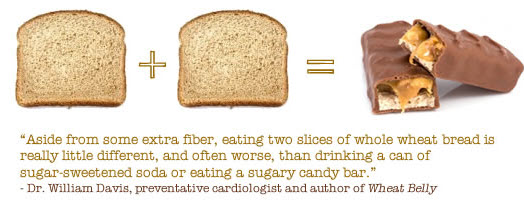 Eating Lots of Carbs, Sugar May Raise Risk of Cognitive Impairment, Mayo Clinic Study Finds
Eating Lots of Carbs, Sugar May Raise Risk of Cognitive Impairment, Mayo Clinic Study Finds
Those 70-plus who ate food high in fat and protein fared better cognitively, research showed
Commentary by Dr. David Duke
Here is some amazing new evidence about the effect of Carbs and sugar on the aging brain, and also one that shows that fat and protein are critically important for brain health and cognition.
Although fat is constantly demonized, note that the subjects whose fat intake was the highest had less likelihood of cognitive impairment than those whose fat intake was lowest! And that when one takes into account total fat and protein consumption compared to to the highest carbohydrate consumption, (grains, fruits, sugars), the high carbohydrate consumers had 3.6 times more likelihood of cognitive impairment!
This is what I have been talking about on my show for months, and science continues to validate a high fat high protein, low carbohydrate style paleolithic diet for health benefits.
A new study by Mayo Clinic, one of the most respected medical clinics in the world, has shown that people “70 and older who eat food high in carbohydrates have nearly four times the risk of developing mild cognitive impairment, and the danger also rises with a diet heavy in sugar, Mayo Clinic researchers have found. Those who consume a lot of protein and fat relative to carbohydrates are less likely to become cognitively impaired, the study found. The findings are published in the Journal of Alzheimer’s Disease.”
MULTIMEDIA ALERT:: For audio and video of Dr. Roberts talking about the study, visit Mayo Clinic News Network.
The research highlights the importance of a well-rounded diet, says lead author Rosebud Roberts, M.B., Ch.B., a Mayo Clinic epidemiologist.
According to the Mayo Clinic: Researchers tracked 1,230 people ages 70 to 89 who provided information on what they ate during the previous year. At that time, their cognitive function was evaluated by an expert panel of physicians, nurses and neuropsychologists. Of those participants, only the roughly 940 who showed no signs of cognitive impairment were asked to return for follow-up evaluations of their cognitive function. About four years into the study, 200 of those 940 were beginning to show mild cognitive impairment, problems with memory, language, thinking and judgment that are greater than normal age-related changes.
Those who reported the highest carbohydrate intake at the beginning of the study were 1.9 times likelier to develop mild cognitive impairment than those with the lowest intake of carbohydrates. Participants with the highest sugar intake were 1.5 times likelier to experience mild cognitive impairment than those with the lowest levels.
But those whose diets were highest in fat — compared to the lowest — were 42 percent less likely to face cognitive impairment, and those who had the highest intake of protein had a reduced risk of 21 percent.
Now read this quote from the Mayo Clinic Statement:
When total fat and protein intake were taken into account, people with the highest carbohydrate intake were 3.6 times likelier to develop mild cognitive impairment.
“A high carbohydrate intake could be bad for you because carbohydrates impact your glucose and insulin metabolism,” Dr. Roberts says. “Sugar fuels the brain — so moderate intake is good. However, high levels of sugar may actually prevent the brain from using the sugar — similar to what we see with type 2 diabetes.”
The study was funded by the National Institute on Aging.



